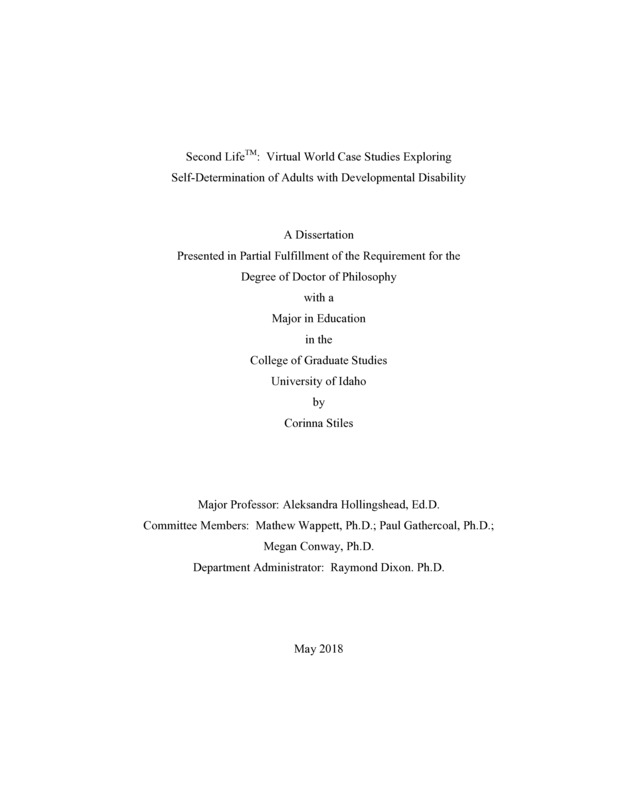Second LifeTM: Virtual World Case Studies Exploring Self-Determination of Adults with Developmental Disability
Stiles, Corinna H.. (2018-05). Second LifeTM: Virtual World Case Studies Exploring Self-Determination of Adults with Developmental Disability. Theses and Dissertations Collection, University of Idaho Library Digital Collections. https://www.lib.uidaho.edu/digital/etd/items/stiles_idaho_0089e_11316.html
- Title:
- Second LifeTM: Virtual World Case Studies Exploring Self-Determination of Adults with Developmental Disability
- Author:
- Stiles, Corinna H.
- ORCID:
- 0000-0002-4828-3746
- Date:
- 2018-05
- Embargo Remove Date:
- 2020-09-05
- Keywords:
- autism spectrum disorder causal agency theory developmental disability Second Life self-determination virtual worlds
- Program:
- Interdisciplinary Studies
- Subject Category:
- Special education; Education
- Abstract:
-
Studies report the virtual world program Second LifeTM is a successful environment for learning, treatment, support services, and social activities (Wagner, 2008; Davis, Owens, Khazanchi and Zigurs, 2009; Nosek, Robinson-Whelen, Hughes, & Nosek, 2016). However, minimal studies specifically explore whether Second LifeTM can support self-determination of adults with developmental disabilities. This study investigated whether activities conducted by adults with developmental disabilities in Second LifeTM can influence self-determination. Secondarily the study also investigated whether self-determination experienced in Second LifeTM can transfer to the physical world.
Chapter one Introduction provides the context for the study including the background of the problem, the significance of the study and definition of key terms. Chapter two Literature Review explains Second LifeTM and explores the use of virtual worlds as a learning, treatment and support services environment; as an environment for self-determination and; the transference of virtual world experiences to the physical world. Chapter two also provides a comprehensive look at the theoretical framework that informs the literature review, study design, and analysis of this study. These elements frame the study for the researcher, and help the reader to understand the context for how the researcher approached the study. Chapter three Methodology provides a description of the research design including how participants were selected, how data was gathered, how the researcher followed protocols to protect participants, how data was analyzed and validated, and what the study sought to accomplish. Chapter four Findings includes case studies presenting the influence and outcomes of Second LifeTM activities on self-determination in the physical world as experienced by two adults with Autism spectrum disorder. The chapter also introduces gatekeeping and its possible impact on participant selection. Chapter five Discussion, Implications, and Recommendations provides a discussion of the results, conclusions, limitations and recommendations for further research. The findings of this study support the hypothesis that activities conducted in a virtual world by adults with developmental disabilities can influence self-determination and that self-determination experienced in a virtual world can transfer to the physical world. Ongoing research in the use of virtual world programs to support self-determination of adults with developmental disabilities would be beneficial and further contribute to expanding the opportunities to experience self-determination.
Key words: Second LifeTM, virtual worlds, developmental disability, autism spectrum disorder, causal agency theory, self-determination
- Description:
- doctoral, Ph.D., Interdisciplinary Studies -- University of Idaho - College of Graduate Studies, 2018-05
- Major Professor:
- Hollingshead, Aleksandra
- Committee:
- Wappett, Mathew; Gathercoal, Paul; Conway, Megan
- Defense Date:
- 2018-05
- Identifier:
- Stiles_idaho_0089E_11316
- Type:
- Text
- Format Original:
- Format:
- application/pdf
- Rights:
- In Copyright - Educational Use Permitted. For more information, please contact University of Idaho Library Special Collections and Archives Department at libspec@uidaho.edu.
- Standardized Rights:
- http://rightsstatements.org/vocab/InC-EDU/1.0/

